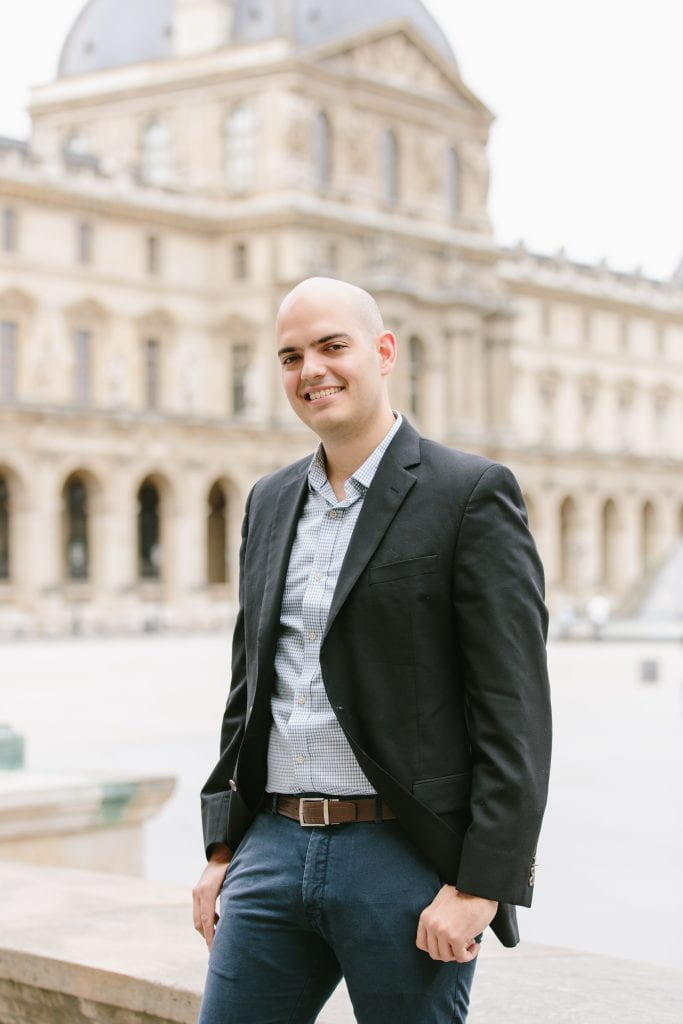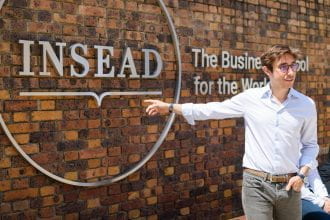 Assistant Professor Andre Calmon is one of INSEAD’s rising stars. His research focuses on the hot topic of the social and environmental impact of business operations, while his MBA elective on business sustainability is one of the most popular in the programme. But his interest began in an unlikely place… mathematics. While studying at a prestigious summer school in his native Brazil, he met kids from the favelas who were maths geniuses but whose parents were illiterate. Unlike the young Andre, they weren’t destined for success in life because they could never pass grammar exams. “That was when I realised I couldn’t spend my life just doing math theory,” he says. Instead, he started thinking about how he could apply analytical models to questions of sustainability and economic development. “I was determined to use data and analytics to address the big questions society was facing,” he explains.
Assistant Professor Andre Calmon is one of INSEAD’s rising stars. His research focuses on the hot topic of the social and environmental impact of business operations, while his MBA elective on business sustainability is one of the most popular in the programme. But his interest began in an unlikely place… mathematics. While studying at a prestigious summer school in his native Brazil, he met kids from the favelas who were maths geniuses but whose parents were illiterate. Unlike the young Andre, they weren’t destined for success in life because they could never pass grammar exams. “That was when I realised I couldn’t spend my life just doing math theory,” he says. Instead, he started thinking about how he could apply analytical models to questions of sustainability and economic development. “I was determined to use data and analytics to address the big questions society was facing,” he explains.
Closing the loop
The next stop was MIT, where Andre completed a PhD in operations management, creating new data-driven approaches to manage the circular economy and applying it to a partner telecoms giant. His goal was to perfect the process of instantly exchanging a broken cell phone for a refurbished model – thereby delighting the customer… and providing another handset for the refurbishment workshop. “That clearly creates a loop,” says Andre. “But it’s a very big and complex loop, because the company I worked with receives about 10,000 broken phones every day!”
After the PhD, the decision to cross the Atlantic to launch his academic career was an easy one. “If you want to go global, there’s no better place than INSEAD, he says. “Also, our MBA students are considered some of the smartest and savviest in the world. They’re definitely known as the most challenging and interesting to teach.” Alongside the core MBA Process & Operations Management course, he also teaches an elective in Business Sustainability and is pursuing his research in sustainable operations, but now with more of a focus on developing economies.
Professor Calmon, as he’s known these days, is intrigued above all by the question of how doing business in the developing world is different. His recently completed paper on Essmart, a pioneer in selling life-improving technologies in Africa and India, offers two answers: customers are more risk-averse than in the west and lack accurate information about the products they are buying. “Imagine the situation,” says Andre. “If you’re investing two weeks of your salary, you’re going to think much harder and longer about buying into a new technology, say, a solar lamp – especially if you have an old technology like a traditional kerosene lamp that works perfectly well.” One business solution, according to his research, is for suppliers to invest in “reverse logistics”, such as warranties, to reduce customer risk.
Where profit and sustainability go hand in hand
“My aim in both my research and teaching is to demonstrate that positive social and environmental impact is compatible with financial growth and profit,” he says, “although sometimes I frame my work as ‘Extreme Operations’!” It’s a comment that raises a couple more questions…
First, do today’s MBA students – traditionally seen as a money-focused group – really buy the idea of business benefiting society? “Well, my elective is currently full,” says Andre. “The first time I ran it I had a total of 40 students. Now I have 120.” That means around a quarter of the intake are opting for a serious course in sustainability and business operations. As Andre explains, often there’s an “awakening” during the class. But more and more students are arriving at INSEAD with a social impact background. “Business as a force for good is much more than a marketing catch phrase. INSEAD definitely walks the talk,” says Andre.
Second, what’s so extreme about sustainability anyway? Andre maintains that most of the sustainability issues researched at INSEAD – like his own closed-loop supply chains – are extreme versions of traditional operations issues. “Imagine setting up a supermarket chain in Ethiopia,” he says. “You have none of the data or predictability that you’d have in the west about consumers, prices, lead times. Or take humanitarian logistics. There the cost of a slow supply chain is human lives. And what could be more extreme than encountering issues like child labour?”
The upside of uncertainty
The good news, however, is that if you don’t have data, you can experiment, while also (insists Andre) carefully collecting data as you go! And he’s particularly proud when he sees his own former students creating innovative companies in fragmented markets – and leapfrogging traditional businesses with traditional business models. A great example, he suggests, is StanPlus, founded by Antoine Poirson, Prabhdeep Singh and Jose Leon (all MBA’16J). They have created a digital platform that connects patients to ambulances in India using mobile technology.
“The new middle classes of the developing world are creating huge opportunities,” says Andre. And INSEAD graduates are poised to capitalise, while also contributing to economic growth. He adds, “It’s not just that our students are more international; at INSEAD we train people to listen.”
So what’s next for the Brazilian on a mission to change the world through analytics and business model innovation? “There are so many things on the horizon,” he replies. “For example, there are multiple exciting opportunities in sustainable agriculture.” He is currently collaborating with Professor Sameer Hasija on the design of more sophisticated contracts to help small farmers in the developing world. And he is also working with Professor Enver Yücesan on exploring how innovative agricultural business models, such as vertical farms, can transform food supply chains.”
Looking further into the future, Andre is interested in the business implications of potentially disruptive technologies. He is looking at technologies such as Blockchain, the distributed database that was used to create a public ledger for all Bitcoin transactions. “It has enormous potential for peer-to-peer banking in developing countries – or for tracking products like vaccines or organic food, where you need to be able to trace their origins across the globe,” he says. “It’s about sophisticated, trustworthy data management at low cost. Though not yet a reality, it’s a huge area for future business research.”
Again there’s no better place to be doing such research than INSEAD. Or, as Andre puts it, “This school’s time has come.”
To read another Salamander article about Stanplus, click here. To find out more about Professor Andre Calmon and his research, click here


